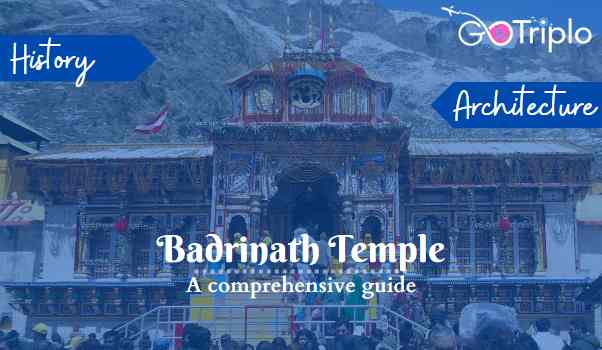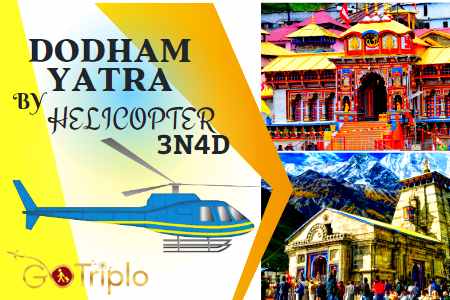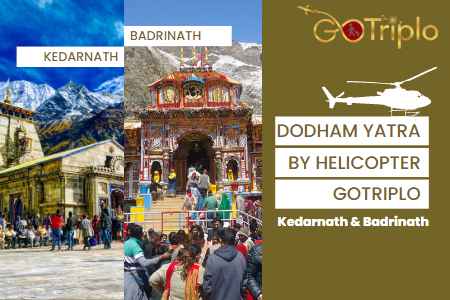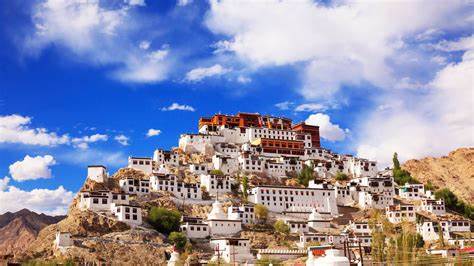
Located in Uttarakhand at an elevation of 11,000 feet, Badrinath is one of India's most popular pilgrimage sites as part of the Char Dham or four shrines dedicated to Lord Vishnu-the Preserver. The main temple is nestled in a hillock and affords a spectacular view for sightseers while providing divine bliss and tranquillity for devotees.
Badrinath is one of the four holy Char Dham
pilgrimage sites of Vishnu avatar, located across India in different cardinal
directions. The other three are Dwarka in Gujarat, Rameshwaram in Tamil Nadu,
and Puri in Odisha.
The breathtaking traditional Garhwali wooden
architecture and majestic snow-capped mountain range provide the perfect
backdrop for the Badrinath Temple complex. Within, one can find the main shrine
dedicated to Lord Vishnu, as well as several additional shrines dedicated to a
variety of gods and goddesses including Shiva.
The idyllic Badrinath, located within the Chamoli
district of Uttarakhand, lies between Nar and Narayana mountain ranges with the
stunningly impressive Neelkantha peak in view. It's a paradise of stunning
natural beauty: azure lakes, spectacular peaks, and sacred ponds all make their
mark on the captivating landscape.
Located in the Himalayas, the Badrinath Temple is
one of India's most revered pilgrimage sites. Dedicated to Lord Vishnu, it
attracts devotees from all over the world and houses a 3.3 feet-tall black
stone idol of Lord Badrinarayan, which is seated in a meditative pose under a
Badri tree and canopy of pure gold.
Within the temple walls, idols of 15 other deities,
including Uddhava (Lord Krishna's friend and devotee), Garuda (Lord Vishnu's
vehicle), Kuber (the god of wealth), Lord Ganesh, Nara and Narayana, Shridevi
and Bhudevi, and Goddess Lakshmi can be found.
Apart from these images, underneath the temple lies
a healing sulphur hot spring called Tapt Kund that pilgrims may take a plunge
in before going inside. It is said to possess medicinal qualities that can cure
numerous diseases. People regularly visit this sacred space to receive
benedictions from Lord Vishnu and also to relish its reverent spirit. With its
spectacular design and religious relevance, Badrinath Temple offers an
unerasable memory for all visitors.
At 6:30 a.m. every day, visitors can gain entry to
the temple and admire the spectacle of Lord Badrinarayan's idol within its
walls. To attend the rituals in peaceful and magical settings, guests need to
make a booking and pay a fee of 4,100 rupees per person.
At the Badrinath temple, the morning ritual of Maha
Abhishek and Abhishek Puja starts at 4:30 a.m. The temple closes at 12 o'clock,
then reopens from 3 p.m. to 9 p.m., so there are plenty of opportunities to take
part in this holiness event. To make it even more special, the most optimal
time to show up is 6:30 a.m., when the first puja happens - prepare for a
particularly well-attended crowd, but it's all worth it for a memorable
experience!
Badrinath temple, one of the busiest temples in
India and part of the Char Dham pilgrimage in Uttarakhand, is the most
accessible temple out of the four. Prior to 1962, however, there was no road
access and people had to traverse over mountains in order to get there.
To visit Badrinath temple, most people take a day
trip from Joshimath. You can also stay overnight in Badrinath if you prefer.
Char Dham Yatra pilgrims usually complete the pilgrimage at this temple after
visiting the Kedarnath temple and coming from either Gauri Kund or Sonprayag.
Trekking to Badrinath can be an exciting journey
for adventurers, allowing them to soak in the gorgeous scenery and unique
culture of Uttarakhand. However, it is very hectic to visit Badrinath via road.
Taking a helicopter is the quickest way to get to
Badrinath. Direct flights are offered from Dehradun; and if you're
participating in the Char Dham Yatra pilgrimage, this is the best way of
ensuring that you complete this journey in the shortest possible time.
The temple is located in a colder region, so it's
open for only six months annually, from April to November. During this time,
thousands of devotees come to receive blessings from Lord Vishnu and experience
the serenity of the area.
The doors of the temple typically open on Basant
PanchamiDussehra and remain open for around 10 days following Diwali. Then, the
temple remains closed for the next 6 months.
Badrinath Temple is a renowned pilgrimage site in
India, with a rich history and spiritual significance tied to Hinduism. It is
thought to have been founded in the 9th century by Adi Shankara, a revered
Indian philosopher and holy figure who was integral in the revival of Hinduism.
An ancient fossilized black stone idol of Lord
Badrinarayan in the form of Lord Vishnu was discovered in the Alaknanda River
and is known as one of eight important Svayam Vyakta Kshetras (self-manifested
statues of Lord Vishnu) in India.
Although the Vedas, which are the oldest Hindu
scriptures, do not mention temples, it is believed that some of their sacred
hymns were composed by sages living in the area. Additionally, there are a
number of post-Vedic texts such as the Puranas that contain references to
Badrinath, which serves to illustrate its great significance within Hinduism.
Annually, thousands of pilgrims flock to this holy
place to revere Lord Vishnu and seek his divine intervention for a better life.
The temple of Badrinath is steeped in history,
mythology, and religious significance to Lord Vishnu. This is confirmed in the
Mahabharata when Krishna tells Arjun that he was Nara in a former body-Narayana
for his compassion, having performed harshness at Badri for many years. Thus,
the area has become known as 'Badri' - emblematic of its veneration to Lord
Vishnu's dual form of Nara-Narayan.
For centuries, pilgrims have been making long journeys
to pay their respects at the holy temple, which is one of the Char Dham Yatra
sites and a Panch Badri temple dedicated to Lord Vishnu.
Across India, five temples stand as monuments of
faith and devotion - each carrying its own unique history and mythology. Of
these, the iconic Badrinath Temple serves as a reminder of the strength of
belief today.
The hallowed city of Badrinath has a long and
opulent past. It was shipped back to prominence as a significant pilgrimage
site by Guru Adi Shankaracharya in the 9th century. During this time, people of
faith trekked hundreds of miles to show their reverence at the sacred temple.
By the time of the Great War, there were only 20 humble abodes where the temple
staff dwelt.
Badrinath Temple is distinguished by its unique
architecture, resembling that of a Buddhist Vihara (temple). It is made out of
stone, with arched windows, and stunning carvings of Hindu gods and goddesses
on the walls and pillars.
Within, there are numerous holy sites honoring Lord
Vishnu, who is thought to be a manifestation of Lord Shiva. The center shrine
displays an image of Lord Vishnu in his four-armed shape known as 'Badri
Narayan' or 'Vishnu Narayan'. People from around India come here to ask favors
from Lord Vishnu and find spiritual bliss.
With these tips in mind, you can have a safe and
enjoyable journey to Badrinath!
·
As it is usually cold here, it's best to bring
plenty of warm woolen clothing.
·
Respect for the place should extend to abstaining
from alcohol and non-vegetarian food.
·
Although the pilgrimage to Badrinath may not be as
strenuous as that of Kedarnath, the low oxygen content of the air can still
cause dizziness. Thus, it is essential to consult a doctor before embarking on
this journey.
·
Be sure to check if photography is allowed inside
the temple, particularly inside the sanctum sanctorum, before taking any
pictures.
Vegetarians at local eateries can enjoy delectable
dishes like aloo paratha, kadhi chawal and dal makhani. And for those who
prefer Chinese cuisine, there are several delicious noodle and fried rice
dishes to try.
In addition to these dishes, there are also savory
snacks such as samosas and pakoras available for satisfying hunger. All of
these dishes use fresh ingredients, making them even more enjoyable.
Badrinath Temple is a hallowed journey site for
Hindus and has been drawing travelers from all around India for centuries. It
is thought that Lord Vishnu abides in this place of worship in his four-armed
shape referred to as 'Badri Narayan' or 'Vishnu Narayan'. Badrinath Yatra By
helicopter is the least strenuous and the most beneficial approach to arrive at
Badrinath. You can without much of a stretch finish your Badrinath darshan in only
1 day.

Char Dham Yatra by Helicopter 2024 | Luxury Packages - Gotriplo :Blueheights Luxury Trips Pvt Ltd
CHAR DHAM YATRA BY HELICOPTER
Duration :5N / 6D From 185000

VIP Do Dham Yatra by Helicopter 3N4D: Kedarnath & Badrinath
DO-DHAM YATRA BY HELICOPTER 3N4D
Duration :3N / 4D From 130000

Same Day Do Dham Helicopter Tour Package from Dehradun, Badrinath and Kedarnath Tour Packages
SAMEDAY DODHAM YATRA BY HELICOPTER
Duration :1N / 2D From 100000

Char Dham Yatra by Road, Book Online Kedarnath, Badrinath, Gangotri And Yamunotri Tour Packages
CHARDHAM YATRA 8N9D BY ROAD
Duration :8N / 9D From 50000

Explore Greece with These Amazing Tour Packages
Best of Greece
Duration :7N / 8D From 0

ladakh Package
Panaromic ladakh Ex Delhi
Duration :6N / 7D From 60650
Get Customized Travel Quotes from Trusted Travel Agents